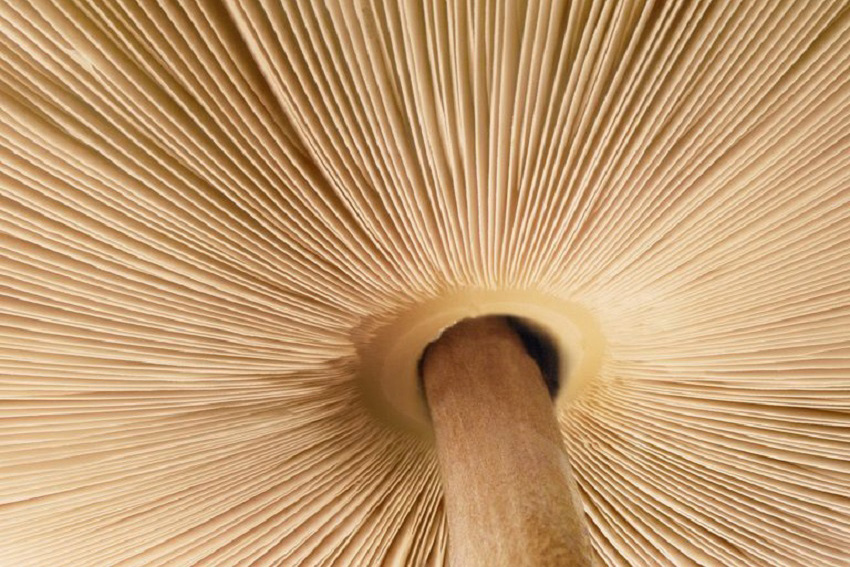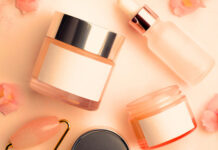The humble mushroom has had a beauty rebrand. Once viewed in the West as a bulking foodstuff, the fantastical fungi has become a big hit in the search for sustainable skincare ingredients.
From biodegradable packaging to its incorporation into footwear and clothing (yes you heard us correctly), mushroom’s stocks are certainly on their way up. While this soil-grown superhero started turning heads in the mainstream skincare scene last year, its success among both natural-beauty lovers and science-driven shoppers has taken it from fad to permanent fixture.
Your aversion to their taste might have had you diligently picking mushrooms out of your food, but there’s a good chance you’ve been slathering fungi-fused foundations or skin calming creams on your face this entire time.
Read on for everything you need to know about the role of mushrooms in skincare, so you can decipher your tremella for your t-zone from your chaga in your cleanser.
Everything You Need To Know About Mushrooms in Skincare
How long have mushrooms been used in skincare?
While the incorporation of mushrooms into skincare is relatively new in the West, that’s because we’ve been a bit slow to catch on. ‘Mushrooms have long been used in Asia for their ability to improve health, maintain vitality, preserve a youthful appearance, and to counter the adverse health effects of chronic stress,’ says practitioner of integrative medicine Dr. Andrew Weil.

In fact, Dr Weil was the first to bring medicinal mushrooms into the beauty sphere back in 2005. While we were still applying sparkly eyeshadow and rollerball body glitter (no regrets), Dr Weil’s innovative work with Origins resulted in the Mega-Mushroom Relief & Resilience collection, which 16 years later continues to be a huge hit.
Are mushrooms dermatologist-approved?
So what is it that makes mushrooms so appealing for use in skincare? As it turns out, dermatologists were among the early adopters of the fungi in western skincare. ‘Kojic acid derived from mushrooms has been used in skincare for years,’ says skin-focused doctor Dr Kemi Fabusiwa.
‘It’s a tried and tested ingredient that is used in an assortment of products to brighten the skin and reduce hyperpigmentation.’ You could say, the future of the mushroom was looking bright…
A lot of mushrooms are classed as adaptogens, which as explained by Dermalogica education manager Victoria Evans, is an ingredient that ‘works at a molecular level to bring balance and regulate cell function.’ While adaptogens have obvious advantages for the body, these perks translate to the skin too.
What are the skincare benefits of mushrooms?
We all love rooting for the underdog, which might go someway to explaining the growing popularity of the shroom. But there’s much more lying beneath these fleshy organisms than meets the eye; ‘Often it’s not the prettiest plant that has the biggest benefit to the skin and this is certainly true of mushrooms,’ says founder of Adaptology Laura Rudoe.
‘As a pretty powerful adaptogenic ingredient, they help to calm stress, normalise hormones and reduce inflammation.’
In fact, its anti-inflammatory properties are a pretty big selling point for the fungi when it comes to skincare; ‘Studies on several unique mushroom species show promising anti-inflammatory effects, and the topical use of anti-inflammatory mushrooms may help protect skin against damage from environmental stressors,’ explains Dr Weil.
Other varieties check the boxes when it comes to those of us prone to dry and dehydrated skin too; ‘Mushrooms contain omega fatty acids and ceramides which can help to build up the skin’s moisture barrier, preventing water loss and keeping hydration within the skin,’ says Dr Fabusiwa.
Whatever your skin type or trouble, there’s a pretty good chance that incorporating mushrooms into your skincare will be a welcome addition.
How should I be using mushrooms in my skincare?
Hopefully you were told as a child not to go picking random mushrooms in the local woods (and if you weren’t: we’re telling you now). In the same vein, before you go raiding your local farmers market, you should probably know a few things about mushroom’s efficacy.
‘Eating mushrooms can be a great component of a healthy balanced diet but if you want to reap the benefits on your skin then it has to be applied topically,’ advises Dr Fabusiwa. ‘This is because the nutrients gained by ingesting mushrooms would be digested in your GI tract.’
If you were thinking of getting creative with a DIY fungi face mask at home, we strongly advise leaving the skincare formulating to the professionals. ‘Each species of mushroom used on skin must be extracted and incorporated into formulas that maximise its benefits,’ says Dr Weil.
Read and repeat: a GCSE in chemistry doesn’t qualify you to start concocting your own face creams. ‘Cooking up your skincare ingredients at home may actually lead to irritation and hypersensitive skin,’ explains Dr Fabusiwa.
Thankfully, you don’t need a trained truffle hog to sniff out the best fungi. To simplify what mushrooms you should be looking out for, we’ve compiled a quick guide to skincare-friendly fungi below.
CHAGA MUSHROOM
Skincare benefits: Antioxidant, restoring, reduces redness and sensitivity
One of the most potent and popular mushrooms in skincare, the chaga mushroom is a powerhouse of skincare benefits. ‘Chaga is packed with UV-blocking melanin and is richer in antioxidants than superfood berries,’ says Rudoe. ‘It provides protection against temperature variations, helping to restore the skin barrier, reduces any sign of redness and sensitivity as well as strengthening capillaries.’
SNOW MUSHROOM
Skincare benefits: Hydrating, protecting
Small, a little weird looking, but incredibly mighty when it comes to its hydrating power, the snow mushroom (also known as Tremella Fuciformis) has gained our respect. ‘The snow mushroom holds 450x its weight in water so is extremely hydrating for the skin,’ says Evans.
‘Plus it’s rich in antioxidants, Vitamin D, polysaccharides and phospholipids, so offers multiple skin conditioning, hydrating and protective benefits.’
Skincare benefits: Minimises traditional signs of ageing, soothing
According to Dr Weil, the Reishi Mushroom is ‘known as the “Mushroom of Immortality” and as a symbol of longevity.’ An adaptogenic mushroom, it carries some weight when it comes to anti-aging and strengthening the skin barrier. ‘It’s also a powerful anti-irritant that helps visibly soothe and calm the skin,’ he adds.
Skincare benefits: Brightening and evening skin tone
Whether you’re looking for something to gently fade dark spots or level out uneven skin tone, Shiitake mushroom is a great option thanks to its high levels of Kojic Acid (that dermatologist favourite we mentioned earlier).‘White Shiitake Mushroom has been shown to improve skin tone by degrading melanin thus fading dark spots,’ says Evans.
Skincare benefits: Antioxidant, improves skin elasticity, anti-inflammatory
As you might have realised by a now, some variations of mushrooms are high-key overachievers when it comes to skincare, and cordyceps might just take the top spot. ‘A potent source of antioxidants, cordyceps can help hydrate dry skin, boost collagen, and elastin production,’ says Rudoe.
‘They have been proven effective as a topical treatment for inflammatory conditions like eczema and also help the skin to deal with and overcome one of the biggest sources of skin aging – the effect of environmental damage – by helping to reduce skin-damaging inflammation.’
Source: https://www.elle.com/uk/beauty/skin/a36381706/mushroom-skincare/



